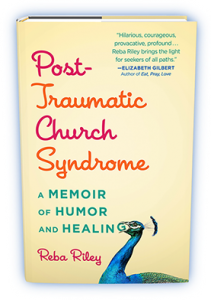This book response is part of the Patheos Book Club on Spiritual Healing and Post-Traumatic Church Syndrome. You can read the first four chapters of PTCS on Bookgrabbr.com.
 Thirty before Thirty: Reba Riley—chronically ill , spiritually destitute, and in search of healing—made it her project to visit thirty religions before her thirtieth birthday.
Thirty before Thirty: Reba Riley—chronically ill , spiritually destitute, and in search of healing—made it her project to visit thirty religions before her thirtieth birthday.
It might sound like a shallow project to some, as it did to one of the rabbis she visited in the course of her year. But Post-Traumatic Church Syndrome is not an attempt to catalogue the world’s religions. Rather, it’s a memoir of Reba’s attempt to get outside of her narrow sense of self, to push her boundaries by exploring the wounds she carried from leaving her childhood religion, pentecostal Christianity.
I’m not like Reba in that particular way; I left Christianity gently with no hard feelings. But I relate to this: she finds her fear and runs straight for it. And I relate to this: for Reba, spiritual growth isn’t a luxury, but a matter of life and death.
I was twenty-nine too (Saturn return!) when I left my marriage and my career and moved across the country, hoping that a change in external circumstances would shift my internal pain. And when that didn’t work, I plunged into the most intense period of spiritual practice in my life, spending at least an hour a day at my altar. As with Reba, a combination of self-observational and stillness meditation were the linchpins to finding my way out of the spiritual prison I’d made for myself. When Reba seeks the heart of Being and finds Love, I just had to cheer. I remember that journey.
What I did not have was Reba’s excellent sense of humor. PTCS is an easy read, self-deprecating and funny—so funny, in fact, that it may be hard to grasp the depth of suffering, both physical and spiritual, that she endured. There’s deep experience here, wrapped up in a bright, silly-looking package. On the cover, Reba’s spirit animal, a peacock, attempts to eat part of the title: Is this a book we’re meant to take seriously?
Unadulterated seriousness will not serve you in reading this book; nor, I think, does it speed the process of spiritual healing. Wiccans and other witches will recall that in “The Charge of the Goddess,” we are asked to carry both mirth and reverence within us (a combination that well describes Reba’s visit to a public Beltane circle, incidentally—tangled maypole and all). Spirituality has a place for laughter, for spontaneity and experimentation—but those characteristics are not incompatible with discipline. Since Reba encourages the reader to join her in making fun of herself, it’s easy to miss how challenging months-long dedication to daily meditation practice is—and this is a discipline that ultimately bears much fruit. Reba may tell her story lightly, but there is determination here, and drive. There is humor here because the task is so heavy.
Is this a book for Pagans? If you are a Pagan of the scarred, ex-conservative Christian kind, this book is definitely for you. And if you are an earnest spiritual seeker, Post-Traumatic Church Syndrome may give hope that trauma, spiritual brokenness, and debilitating illness can sometimes be healed. It is an uplifting book, not because it turns away from suffering and pain, but because it refuses to remain there.
There is one other way that PTCS provides a breath of fresh air. It is not a meaningful profile of thirty religions—the story is really about Reba’s journey. But what Reba does very well is convey how profoundly different these religions and their practitioners are seem to her. Though she doesn’t leave her home state, there is enormous variety of thought and practice in her backyard. This aspect of the book is an antidote to the claustrophobia that can come from spending too much time in one’s own religious community—using its jargon, asking its questions, pursuing its goals. (I think this is something Reba understands well, from her use of the term Christianese: the coded language in which Christians enforce their community’s norms.) It is a great relief sometimes to remember that other people have never heard of the great spiritual debates that so vex my religious community—they have their own weighty matters, their own vocabulary, and they work from completely different first principles. This reminder of the vastness of human experience can be freeing. Our differences, though so often a source of struggle, are also a source of great joy.
For Pagans with Christian families, this book may act as a bridge to open up sincere, thoughtful conversations about faith. More generally, I recommend it for anyone looking for a light and funny read that I, at least, am still reflecting on weeks later.
Hello all! I’m easing back into blogging with a series of book reviews. Next up: a biography of award-winning comics artist and occultist Alan Moore.
















